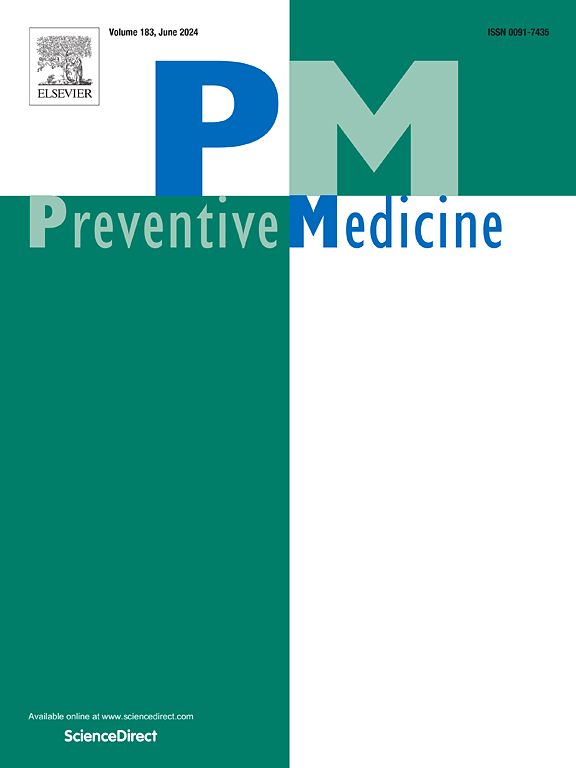中年妇女体力活动变化与认知表现的纵向关联:全国妇女健康研究。
IF 3.2
2区 医学
Q1 MEDICINE, GENERAL & INTERNAL
引用次数: 0
摘要
目的:确定中年时增加体力活动是否与随着时间的推移认知能力下降减少有关。方法:全国妇女健康研究是一项正在进行的纵向研究,于1996年开始,对中年妇女进行了不同的队列研究。包括认知和身体活动测试。体力活动的分析基线是在认知测试之前,从零到六次就诊的平均值。缺乏教育水平或基线中风,或少于两次基线体力活动或三次认知评估的女性被排除在外。体力活动的变化计算为分析基线时代谢当量任务(MET)小时与第9、12、13和15次就诊之间的差异(2017年)。在第9次就诊时定义认知基线以减少练习效果。采用混合线性和泊松回归模型分析了身体活动变化与加工速度认知[符号数字模态测试(SDMT)]、工作记忆[向后数字广度测试(DSB)]和言语情景记忆[东波士顿记忆测试-延迟回忆(EBMT-d)]的纵向关联。结果:我们的样本包括2020名女性。基线MET小时/周平均(SD) 6.8(2.4)。在调整了社会人口统计学、医学和情绪行为因素后,从身体活动基线开始,MET小时/周的增加与SDMT分数的提高呈正相关[β = 0.02(0,0.04)]。其他两项测量没有观察到显著的关联。结论:随着时间的推移,体力活动的增加与更高的处理速度有关,但与工作或言语情景记忆无关。中年妇女增加体力活动可能延缓认知能力下降。本文章由计算机程序翻译,如有差异,请以英文原文为准。
Longitudinal association of change in physical activity and cognitive performance in midlife women: Study of women's health across the nation
Objective
To determine if physical activity increase at midlife is associated with less cognitive decline over time.
Methods
The Study of Women's Health Across the Nation, an ongoing longitudinal study, started in 1996 with a diverse cohort of midlife women, and. Included cognitive and physical activity tests. Analytic baseline for physical activity was the average of visits zero through six, prior to cognitive testing. Women missing educational levels or baseline stroke, or fewer than two baseline physical activity or three cognitive assessments, were excluded. Change in physical activity was calculated as difference between metabolic equivalent of task (MET) hours at analytic baseline and visits nine, 12, 13, and 15 (2017). Cognitive baseline was defined at visit nine to reduce practice effects. Longitudinal association between physical activity change and cognition for processing speed [Symbol Digit Modalities Test (SDMT)], working memory [Digit Span Backwards (DSB)], and verbal episodic memory [East Boston Memory Test- delayed recall (EBMT-d)] were analyzed using mixed linear and Poisson regression models.
Results
Our sample consisted of 2020 women. Baseline MET hours/week was Mean (SD) 6.8 (2.4). Increases in MET hours/week from physical activity baseline was positively associated with higher SDMT scores over time, adjusting for sociodemographic, medical, and emotional-behavioral factors [β = 0.02 (0, 0.04)]. No significant associations were observed for the other two measures.
Conclusion
Physical activity increase was associated with higher processing speed over time but not with working or verbal episodic memory. Increased physical activity in midlife women may delay cognitive decline.
求助全文
通过发布文献求助,成功后即可免费获取论文全文。
去求助
来源期刊

Preventive medicine
医学-公共卫生、环境卫生与职业卫生
CiteScore
7.70
自引率
3.90%
发文量
0
审稿时长
42 days
期刊介绍:
Founded in 1972 by Ernst Wynder, Preventive Medicine is an international scholarly journal that provides prompt publication of original articles on the science and practice of disease prevention, health promotion, and public health policymaking. Preventive Medicine aims to reward innovation. It will favor insightful observational studies, thoughtful explorations of health data, unsuspected new angles for existing hypotheses, robust randomized controlled trials, and impartial systematic reviews. Preventive Medicine''s ultimate goal is to publish research that will have an impact on the work of practitioners of disease prevention and health promotion, as well as of related disciplines.
 求助内容:
求助内容: 应助结果提醒方式:
应助结果提醒方式:


